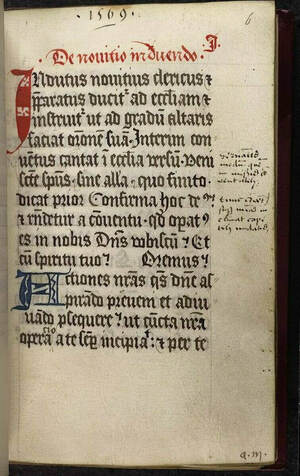Living History: Medieval-style document governs grad life at the Medieval Institute

In the early thirteenth century, Richard Poore, then the dean of Salisbury Cathedral in England, and the future bishop of that diocese, set out to create a document that would provide a comprehensive guide to the liturgical and communal customs that had become standard at the cathedral but were not outlined in its official ritual books and rules.
His Consuetudinarium has become a well-known example of the medieval practice of "customaries."
Believe it or not, the medieval customary served as the inspiration for a handbook created by graduate students, for graduate students, that still governs grad life today at the Medieval Institute. For over twenty years a Customary, maintained by current MI graduate students, has given a medieval twist to student self-governance. This living document preserves accreted customs and practices for MI graduate students. Its particulars go beyond formal Notre Dame guidelines, and it has been updated several times over its twenty-year history.

According to Michael Waddell (MI Ph.D. '00), now Associate Professor of Philosophy at St. Mary's College, the Customary came to be in the mid-to-late 1990s when a group of students expressed a desire to pass on several recent MI traditions that had enriched their own experience. When one student suggested, half-jokingly, "we need a customary!," the group of students realized that this was exactly what they were looking for, and the idea was quickly adopted.
In addition to its nod to the Middle Ages, a customary better expressed the openness to future edits and additions than a constitution. Waddell, who himself composed the first version of the Customary, said that the document “felt like a fun way for medievalists to hold onto some of what we valued in the past, in hopes that future students would enjoy their time in the institute as much as we did.”
An example of a process now guided by the Customary is the annual Graduate Student Invitation Lecture Series. Each year's speaker is selected, hosted, and introduced by the institute's graduate students. The graduate student representatives plan the visit from start to finish, with the guidance of the institute's assistant director.
This event began in 2004 when the institute's student representatives approached then-director of the MI Thomas F. X. Noble to request a student-led lecture series. As Medieval Studies Librarian Julia Schneder (MI Ph.D. '11) remembers, "it was exciting to see this graduate student lecture be codified into the customary, so we would know that graduate students would benefit from this opportunity for years to come." Other policies covered in the Customary include processes for regular events, like the nomination and election of the three graduate student representatives, and study carrel selection.
The Customary provides the guidance for these processes to run smoothly, while also allowing for changes to the procedure as the need arises. It is this mix of regulation and flexibility that makes the MI Customary a beloved tradition for Medieval Institute graduate students.